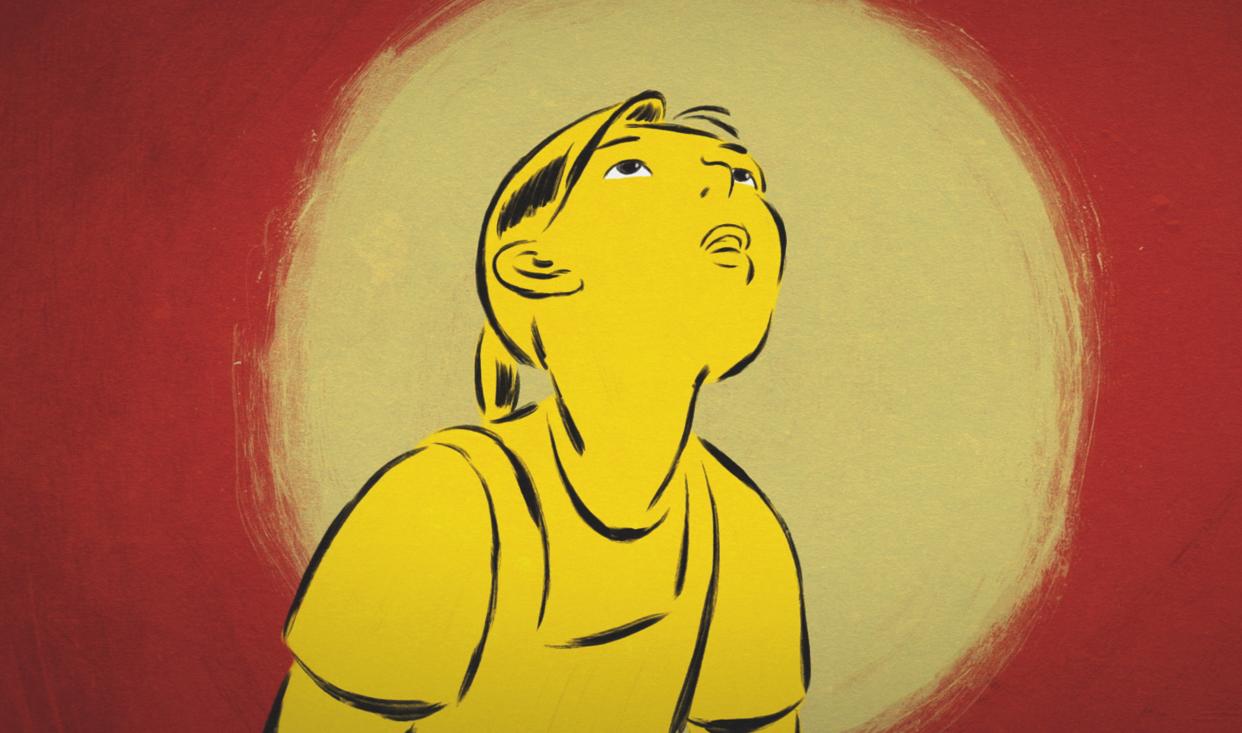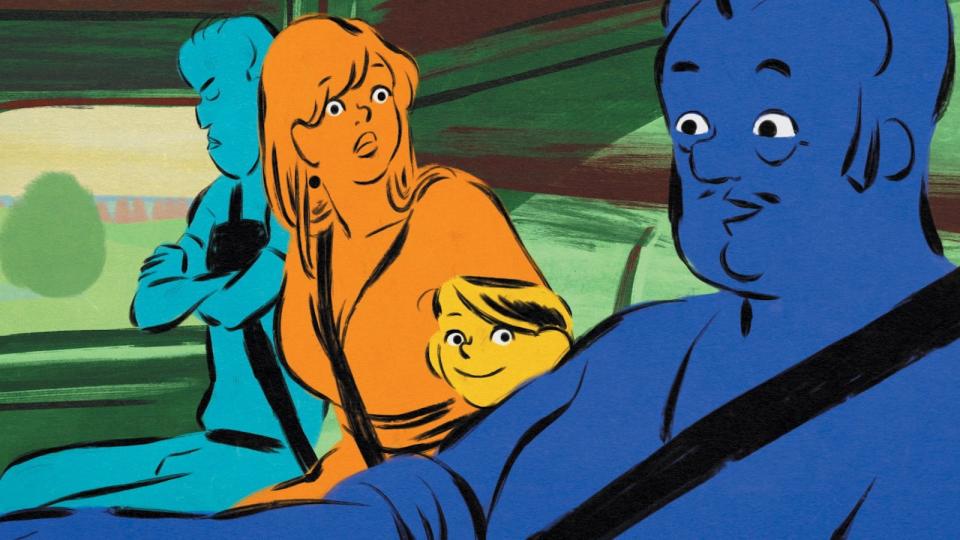‘Chicken for Linda’ Review: This Spirited Musical About a Hungry Little French Girl Is One of the Best Animated Movies in Years


Animation has the power to make even the simplest emotions feel as infinite and expressive as our most sacred memories, which — despite the edifying nuance and eye-popping flair of recent films such as “Encanto” and “Across the Spider-Verse” — can make it frustrating that American studios have largely been trending toward overcomplicated plots and realistic design. Sébastien Laudenbach and Chiara Malta’s extremely French “Chicken for Linda” is the clearest possible reminder of what we’ve been missing. It’s about an eight-year-old girl named Linda who wants to eat chicken for dinner. Delightful mayhem ensues.
As in Laudenbach’s “The Girl Without Hands,” all of the characters are traced with thick black lines that lend them the aspirational possibility of a fashion sketch; each of them is filled in with a single swash of color that spills over the charcoal borders of their body whenever they get excited. Linda (voiced by Melinée Leclerc) is yellow, because that’s her favorite shade. Her exasperated single mom Paulette (Clotilde Hesme) is orange. Their pet cat Gazza is purple, Linda’s yoga teacher aunt (Laetitia Dosch as Astrid) is a soft pink, and the chicken who ties this whole story together is a clucking brown-red blur who seems like another bird altogether whenever he exposes his bright white underbelly.
More from IndieWire
Dev Patel Broke a Hand While Filming 'Monkey Man' - So He Fought with the Other One
'Legally Blonde' Spinoff Series in the Works from Reese Witherspoon at Amazon
There are three wonderful musical numbers written by Clément Ducol, but they feel more like incidental reveries than full-blown showtunes, as characters sing to themselves about the stress of raising kids and the sweet relief of comfort food. Carried by the meandering lilt of a classic Michel Legrand tune (and conveying their same ability to infuse a lifetime of heart-wrenching melancholy into a stanza that seems as casual as breathing), the last of these little ditties moved me to tears, as the purity of this film’s construction suddenly punctured a tiny pinhole into the depths of that inner darkness where all of our half-forgotten memories go. No disrespect to the similarly Proustian rewards of “Ratatouille,” but here is a 73-minute movie — animated by about 10 people — that manages to deliver twice the flavor with a fraction of the ingredients.
Like the stewed vegetables that spirit Anton Ego back to his childhood, the peppery chicken dish that Linda wants for dinner is loaded with even more personal meaning than she’s willing to admit: Its flavor is the most palpable memory she has of her Italian father, who died when Linda was even younger, and exists now only as a meal that her frazzled mom never has enough time to cook (most of the food Paulette makes for her daughter comes out of the microwave). Her late father narrates the movie from within the black hole of Linda’s memory (a place that’s “black like going to bed without a bedtime story”), but the well is too deep for Linda to hear whatever jaunty musings whisper up to her from within.
Besides, her mind is too busy sorting through the kind of echoes that inspire kids to seek chaos and grab shiny things without thinking about the consequences. Shiny things like the green ring that Linda’s dad once gave to Paulette, and that Paulette wants to wear on the rare night out she’s determined to enjoy after abruptly dumping her daughter at Astrid’s house. When Paulette notices the ring is missing, she assumes that Linda must have stolen it — an assumption that Linda is slapped for denying.
Instantly overcome by a guilt that only grows more textured and intense after she discovers her missing jewelry in a puddle of Gazza’s puke, the overextended mom cancels her plans and promises to give Linda anything her little heart desires (a promise accompanied by a piercingly accurate song about how hard it is to say “no” to your kids). Her little heart desires chicken with peppers for dinner the next day. Paulette may not be much of a cook, but she’s soon confronted by a much bigger problem: A general strike has shuttered all of the shops in Paris, and Linda — a free-spirited but impatient sort whose naturalistic cadence and emotional candor allow her to feel a lot more like a real kid than the hyper-exaggerated caricatures of kid-ness who tend to populate animated films — refuses to just let her mom off the hook until the labor crisis blows over.
And so it isn’t long before the desperate Paulette is stealing a chicken from a roadside farm. And then speeding away from the rookie policeman on her tail. And then hiding in the back of a truck whose lovestruck driver is deathly allergic to fowl. And then going to his mom’s house in the hopes that she might know how to kill the bird. And then, and then, and then, and then, as this small but insistently madcap story begins to corkscrew back to the courtyard outside of Linda and Paulette’s apartment complex, where scores of children — depicted in a memorable wide shot as a sea of open mouths — are hungry for something that might satisfy their appetites for the various feelings they’re too young to name.

“Chicken for Linda” needs a supporting cast in order to fluff its wisp of a premise into the stuff of a feature-length film, and the various cutaways to Linda’s friends help anchor this story in a childlike nowness that allows it to play like a manic farce with life-or-death stakes. Regrettably, these peripheral characters also pull focus away from the meat of the action (so to speak), stalling the momentum of a screwball plot that risks the buzzkill of logic — and the wastefulness of making viewers ask “what’s going on?” — every time the movie returns to Linda and Paulette’s grand adventure.
The same could be said of the scenes devoted to Astrid, a candy-loving yoga teacher whose namaste energy is amusingly offset by the rage she feels whenever Paulette storms into her life with an urgent sister request. And yet, the Fosse-like fantasticality of her song makes up for any manner of sins, and her prevailing attitude of fed-up Frenchness adds a crucial layer to the fog cloud of frustration that threatens to separate Linda and Paulette from their deepest feelings.
“Did something exist if you don’t remember it?,” Linda asks her mom during a late night drive at one point. She’s talking about her experience of being in the womb, but — with a degree of self-awareness as limpid and free-flowing as the patches of color that slosh around Linda’s body like the emotions she can’t hope to contain — she’s also talking about her dead father, who has now disappeared into the same dark nothingness that brought her into this world.
But she remembers him better than she realizes, and another taste of the pepper chicken dish he made could have the power to bring him back to her like a home movie that she can watch with her eyes closed. Laudenbach and Malta’s animation speaks to that possibility even when their script is preoccupied with other bits of business, the visible brushstrokes in its storybook backdrops and fully-fleshed characters betraying the very sense of ephemerality that allows the movie they comprise to stay with you. The details fade, but the essence of what they suggest — the core memory that keeps them alive — remains clearer than ever, ready to be re-traced and born anew in living color.
Grade: B+
GKIDS will release “Chicken for Linda” in theaters on Friday, April 5.
Best of IndieWire
Sign up for Indiewire's Newsletter. For the latest news, follow us on Facebook, Twitter, and Instagram.


